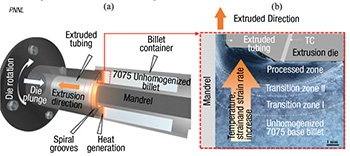Aluminum alloy 7075 has excellent mechanical properties, including high strength for lightweighting applications, but its production process is energy intensive, which raises costs and limits its use. Now, scientists at Pacific Northwest National Laboratory (PNNL; Richland, Wash.; www.pnnl.gov) have developed a process for making the alloy that eliminates the major energy-consuming step in conventional production: homogenization. Eliminating this heat-treatment step reduces the energy required for the overall production by half.
 In conventional production of Al 7075, homogenization involves heating castings of the metal to around 500°C for up to 24 hours to dissolve intragranular secondary phases of alloying elements (aluminum, zinc, magnesium, copper) before extruding the metal. The PNNL team developed a process, known as shear-assisted processing and extrusion (ShAPE), that combines heating and physical deformation of the metals, so that a separate homogenization step is not required.
In conventional production of Al 7075, homogenization involves heating castings of the metal to around 500°C for up to 24 hours to dissolve intragranular secondary phases of alloying elements (aluminum, zinc, magnesium, copper) before extruding the metal. The PNNL team developed a process, known as shear-assisted processing and extrusion (ShAPE), that combines heating and physical deformation of the metals, so that a separate homogenization step is not required.
In the ShAPE machine, metal billets are simultaneously pushed through a small opening in a die that rotates. Together, the rotational movement and deformation thoroughly mixes the metal elements as they are being extruded, PNNL says, essentially, homogenizing the metal billet in a few seconds immediately before it is extruded.
Using ShAPE results in energy savings of up to 50%, PNNL scientists say, and also improves the quality of the mixing of the individual alloying elements, which leads to stronger final products.
A study published in a recent issue of Materials and Design reports electron microscope images of the alloy’s microstructure that show the effectiveness of the ShAPE process at mixing the alloy elements. The technology is available for licensing from PNNL.